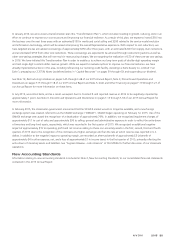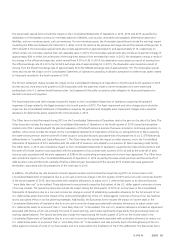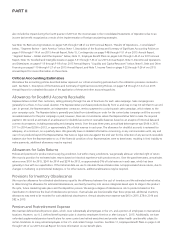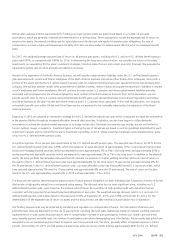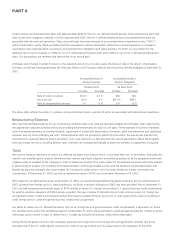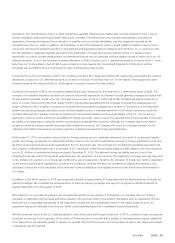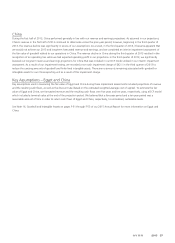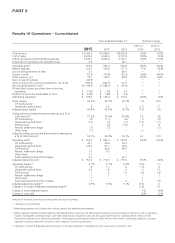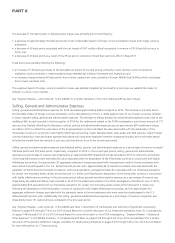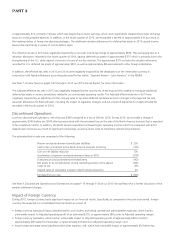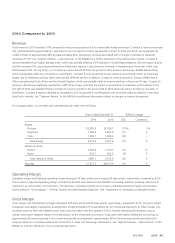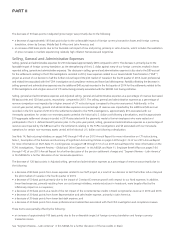Avon 2015 Annual Report Download - page 47
Download and view the complete annual report
Please find page 47 of the 2015 Avon annual report below. You can navigate through the pages in the report by either clicking on the pages listed below, or by using the keyword search tool below to find specific information within the annual report.settlements. This strengthening of the U.S. dollar reduced the expected dividends and royalties that could be remitted to the U.S. by our
foreign subsidiaries, particularly Russia, Brazil, Mexico and Colombia. The effectiveness of our tax planning strategies, including the
repatriation of foreign earnings and the acceleration of royalties from our foreign subsidiaries, was also negatively impacted by the
strengthening of the U.S. dollar. In addition, the finalization of the FCPA settlements, which included a $68 fine related to Avon China in
connection with the DOJ settlement and $67 in disgorgement and prejudgment interest related to Avon Products, Inc. in connection with
the SEC settlement, negatively impacted expected future repatriation of foreign earnings and reduced current U.S. taxable income,
respectively. As a result of these developments, we determined that we may not generate sufficient taxable income to realize all of our U.S.
deferred tax assets. As such, we recorded a valuation allowance of $441 to reduce our U.S. deferred tax assets to an amount that is “more
likely than not” to be realized, of which $367 was recorded to income taxes in the Consolidated Statements of Operations and the
remainder was recorded to various components of other comprehensive (loss) income.
During the first and second quarters of 2015, the Company recorded a $31 charge and a $3 benefit, respectively, associated with valuation
allowances, to adjust our U.S. deferred tax assets to an amount that was “more likely than not” to be realized. These adjustments were
primarily caused by fluctuations of the U.S. dollar against currencies of some of our key markets.
During the third quarter of 2015, we recorded an additional valuation allowance for the remaining U.S. deferred tax assets of $642. The
increase in the valuation allowance resulted from reduced tax benefits expected to be obtained from tax planning strategies associated with
an anticipated accelerated receipt in the U.S. of foreign source income. As the U.S. dollar had further strengthened against currencies of
some of our key markets during the third quarter of 2015, the benefits associated with the Company’s tax planning strategies were no
longer sufficient for the Company to continue to conclude that its tax planning strategies were prudent. In the absence of any alternative
prudent tax planning strategies and other sources of future taxable income, it was determined that a full valuation allowance should be
recorded. Although the Company continues to expect that it will generate taxable income and tax liability in the U.S., the Company is
expected to offset its current and future tax liability with foreign tax credits, and as a result, the expected level of future taxable income and
tax liability is not adequate to realize the benefit of previously recorded deferred tax assets. Although the Company may not be able to
recognize a financial statement benefit associated with its deferred tax assets, the Company will continue to manage and plan for the
utilization of its deferred tax assets to avoid the expiration of deferred tax assets that may have limited lives.
At December 31, 2015, we continue to assert that our foreign earnings are not indefinitely reinvested, as a result of our domestic liquidity
profile. Accordingly, we adjusted our deferred tax liability to account for our 2015 undistributed earnings of foreign subsidiaries and for the
tax effect of earnings that were actually repatriated to the U.S. during the year. The net impact on the deferred tax liability associated with
the Company’s undistributed earnings is an increase of $75, resulting in a deferred tax liability balance of $89 related to the incremental tax
cost on $1.4 billion of undistributed foreign earnings at December 31, 2015. This deferred income tax liability amount is net of the
estimated foreign tax credits that would be generated upon the repatriation of such earnings. The repatriation of foreign earnings may result
in the utilization of a portion of our foreign tax credits in the year of repatriation; therefore, the utilization of foreign tax credits is dependent
on the amount and timing of repatriations, as well as the jurisdictions involved. We have not included the undistributed earnings of our
subsidiary in Venezuela in the calculation of this deferred income tax liability as local regulations restrict cash distributions denominated in
U.S. dollars.
In addition, in the fourth quarter of 2015, we recognized a benefit of approximately $19 associated with the implementation of foreign tax
planning strategies. We completed the implementation of these tax planning strategies and expect to recognize an additional benefit of
approximately $30 in the first quarter of 2016.
With respect to our uncertain tax positions, we recognize the benefit of a tax position, if that position is more likely than not of being
sustained on examination by the taxing authorities, based on the technical merits of the position. We believe that our assessment of more
likely than not is reasonable, but because of the subjectivity involved and the unpredictable nature of the subject matter at issue, our
assessment may prove ultimately to be incorrect, which could materially impact the Consolidated Financial Statements.
We file income tax returns in the U.S. federal jurisdiction, and various state and foreign jurisdictions. In 2016, a number of open tax years are
scheduled to close due to the expiration of the statute of limitations and it is possible that a number of tax examinations may be completed.
If our tax positions are ultimately upheld or denied, it is possible that the 2016 provision for income taxes, as well as tax related cash receipts
or payments, may be impacted.
A V O N 2015 35
7553_fin.pdf 37






